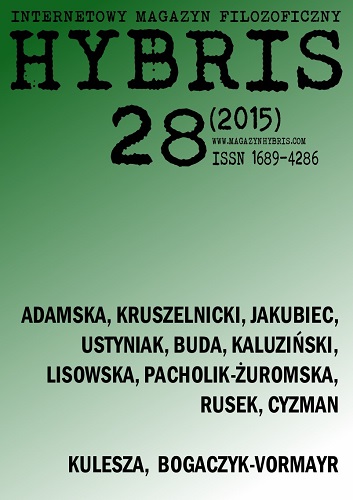Evolution of religion in memetics (Dawkins, Dennett)
DOI:
https://doi.org/10.18778/1689-4286.28.09Keywords:
meme, replicator, New Atheism, cultural selection, imitationAbstract
Since ‘The Selfish Gene’ by Richard Dawkins was published the notion of evolving culture has become a matter of a growing concern which appears to be especially intriguing from the perspective of biology (R. Dawkins), psychology (R. Brodie) as well as philosophy (D. Dennett). The essence of Darwin’s project is a natural selection within the sphere of a natural science. From this standpoint, a human is considered to be an effect of an evolutionary development. In the memetics approach, a human being is perceived in a different manner. An unit of gene, which task is to pass on the information in a process of a natural selection, has been replaced by a notion of a meme that is an entirely new replicator which, as opposed to a gene, may be applied to the various environments, not only a biological one. The crucial factor that determines the uniqueness of every man would be culture. From this point of view, the transfer of culture, which is developing in a specific procedure, is emphasized. What can be included in the evolutionary processes in the vast area of culture? What is the discrepancy between the Dawkins’s biological position and the grounded on a philosophy of mind the position of Dennett? The above mentioned attitudes result in various definitions of meme as well as the further implications that result from these definitions. Does the Theory of Cultural Selection fully explain a matter of the origin and evolution of languages, societies and religions?
References
Biedrzycki, Mariusz, 1998, Genetyka Kultury, Warszawa: Wydawnictwo Prószyński i S-ka.
View in Google Scholar
Blackmore, Susan, 2002, Maszyna Memowa, przeł. Norbert Radomski, Poznań: Dom Wydawniczy Rebis.
View in Google Scholar
Boroch, Robert, 2011, Przeciw memetyce, „Hybris”, nr 15, s. 62–99, http://magazynhybris.com/images/teksty/15/05.Boroch%20[62-99].pdf (03.09.2013)
View in Google Scholar
Brodie, Richard, 1997, Wirus umysłu, przeł. Piotr Turski, Łódź: Wydawnictwo Ravi.
View in Google Scholar
Dawkins, Richard, 2007, Bóg Urojony, przeł. Piotr J. Szwajcer, Warszawa: Wydawnictwo CiS (The God Delusion, New York: Bantam Books 2006).
View in Google Scholar
Dawkins, Richard, 2003, Fenotyp Rozszerzony. Dalekosiężny gen, przeł. Joanna Gliwicz, Warszawa, Wydawnictwo Prószyński i S-ka (The Extended Phenotype. The Long Reach of the gene, Oxford, W.H. Freeman, 1982).
View in Google Scholar
Dawkins, Richard, 1996, Samolubny Gen, przeł. Marek Skoneczny Warszawa: Prószyński (Selfish Gene, Oxford: Oxford University Press 1989).
View in Google Scholar
Dawkins, Richard, 1994, Ślepy zegarmistrz, przeł. A. Hoffman, Warszawa: PIW (The Blind Watchmaker, London: Norton 1986).
View in Google Scholar
Dennett, Daniel, 2008, Odczarowanie. Religia jako zjawisko naturalne, przeł. Barbara Skarga, Warszawa: Państwowy Instytut Wydawniczy.
View in Google Scholar
Kozłowski, Tomasz, 2012, O metodach racjonalnej argumentacji wiary religijnej — David Hume, William James, Daniel Dennett, Łódź (praca magisterska).
View in Google Scholar
Załuski Wojciech, 2012, O teorii kulturowego doboru grupowego na przykładzie chrześcijaństwa w Cesarstwie Rzymskim, „Logos i Ethos”, nr 1 (32), s. 63–79.
View in Google Scholar
DOI: https://doi.org/10.15633/lie.199
Downloads
Published
How to Cite
Issue
Section
License

This work is licensed under a Creative Commons Attribution-NonCommercial-NoDerivatives 4.0 International License.






